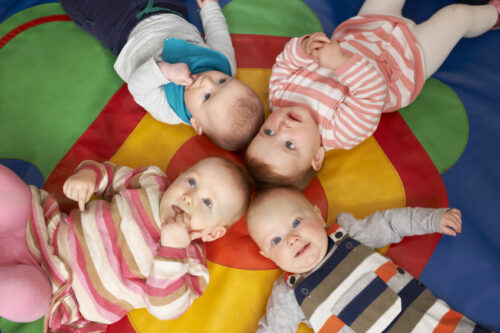By Brittany Fowley —
In today’s busy world that’s full of research and theories there is an abundance of advice and “facts” floating around in parenting circles. Whether it be from your favorite mom blog, parenting guide or the latest hot claim as to what’s best for your baby, parents and caregivers are swimming in advice. You’ll hear what foods make them stronger, what music makes them smarter or what million-mile-long wait list you should get on to get your child into the “It childcare facility.”
Regardless of your age, social/financial status or gender, parents all have the same goal. We want to do everything in our power to ensure our children have every opportunity possible to grow, learn, form friendships and be their very best authentic selves. For your child to achieve their highest developmental potential, it all starts with the social opportunities they receive. And it all begins with infancy.
Infancy (2 months-1 year) is a delicate time when the world around each baby is fascinating and new. Their development during these 10 months is rapid as they take in all their surroundings, especially people. Infants learn through observation and imitation. Yet, as much as they’re loved, what a parent or caregiver can model for their baby is limited compared to what an infant can learn from other babies of a similar age. That’s why social learning for infants is so vital to their development.
There are, of course, options available to parents who would like to provide their child with social interactions. There are Mommy and Me groups as well as library and story times, just to name a few. These settings have their benefits, but they are often structured and child-to-child interaction is not their main objective. In order to really embrace, participate and fully benefit from social learning, you may want to consider somewhere focused solely on your child. In that sense, you may want to consider a childcare center.
Find the right childcare facility and your child can take advantage of the benefits of this socialization through play. The quality of the environment lays the foundation for truly engaging play opportunities. Interactive play with both adults and peers assists a child’s cognitive and emotional development, language skills and builds their confidence. But to fully embrace social learning opportunities for your infant you need to choose a facility that encourages children to move freely and play. Through open-ended play infants form friendships, discover new ways to approach a task or challenge and begin learning how to communicate through both verbal and nonverbal means.
For example, when a baby smiles and laughs while shaking an instrument near a friend, they are sharing this experience. They are observing each other’s reactions to the sound and processing that this motion produces a fun noise, which is enjoyable to their senses. The infant is exposed to other children’s feelings and reactions, which they are absorbing and processing at their own pace. A daycare center that truly commits to utilizing social experiences as the foundation for children’s learning will have interesting and engaging materials accessible to the children. By utilizing these materials children will practice sharing, turn taking and communicating with each other.
If you do decide to enroll your child into a childcare facility, keep a few things in mind. If you visit a center and see all the babies strapped into swings, discover there is more furniture then space for the children to move aboutor find the center does not have open access to age appropriate toys, this may not be the right choice to gain social interaction for you child. If a center seems to check all the preliminary boxes, then it’s time for a visit.
During your visit take notice of how the teachers are speaking to, moving, and caring for the infants. Is the staff using language that is encouraging or discouraging? Do they speak to the children respectfully? Are the infants encouraged to interact with one another? And most importantly, how do you feel when you are in the space? The ideal childcare center will feel warm and welcoming. If you aren’t comfortable, then your infant will most definitely not be comfortable.
The more interaction your infant has with other children the greater the opportunities for them to observe, mimic and discover their own abilities through trial and error. We all want our children to be equal parts happy, healthy, confident learners and it all begins with the social learning experiences we offer beginning in infancy.

About Brittany Fowley
Brittany Fowley has over a decade of experience working in early childhood development and education. She holds a degree in psychology with a focus on Early Childhood Development. During her career has conceptualized, developed and implemented programs to provide children with varying opportunities to explore learning through music, movement and open-ended experiences with an emphasis on social interaction. Ms. Fowley is currently the Educational Director at Explore+Discover Early Learning Center, a Reggio Emilia-focused facility in New York. She also is a mother of three children.
To Learn more please visit http://www.explorediscover.net











